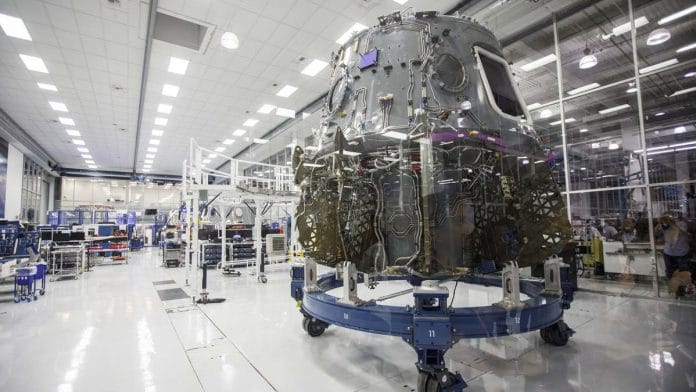San Francisco/Chicago: SpaceX launched an unmanned Crew Dragon craft from Florida to the International Space Station early Saturday, a milestone for Elon Musk’s goal of enabling humans to live on other planets and a big win for NASA’s gamble of partnering with private industry. Scores of space tourists gathered in Florida to watch the 2:49 a.m. launch of the Falcon 9 rocket, which went off without a hitch. Crew Dragon is en route to a rendezvous with the station on Sunday, while SpaceX landed the rocket’s first stage on a drone ship in the ocean.
“I’m a little emotionally exhausted,” Musk said at a NASA news conference. “It was super stressful. But it worked, so far.”
Musk, who founded SpaceX in 2002, also thanked the launch team and noted several additional milestones on the week-long mission, including docking with the orbiting station and then returning the capsule to Earth. “Today’s successful launch marks a new chapter in American excellence, getting us closer to once again flying American Astronauts on American rockets from American soil,” NASA Administrator Jim Bridenstine said in a tweet. “Congratulations to SpaceX and NASA teams for this major milestone in our nation’s history.”
Musk’s company has already made several supply runs to the orbiting lab for NASA. But proving that SpaceX can safely fly humans is key to the company’s ambitions for space tourism and creating a human colony on Mars. Though no astronauts were aboard this first demonstration flight, the successful launch is critical in persuading any doubters and paves the way for SpaceX to launch with astronauts as soon as this summer.
“Human spaceflight is a core value of our business,” Hans Koenigsmann, vice president of build and flight reliability for SpaceX, said at a pre-launch press briefing with NASA Thursday. “We’ve been working on this for close to 17 years. I’m actually humbled at being at this point.”
In 2014, NASA awarded SpaceX and rival Boeing Co. combined contracts worth up to $6.8 billion to fly U.S. astronauts to the space station. The agency chose two companies for the unique public-private partnership to assure safe, reliable and cost-effective access to space while avoiding the perils of one provider having a monopoly. The U.S. government is also eager to have the ability to fly to the ISS without buying seats on Russian Soyuz capsules.Early Saturday, NASA’s Twitter feed and blog posts were filled with images of SpaceX’s Falcon 9 rocket carrying Crew Dragon vertical on the launch pad. Falcon 9 lifted off from the Kennedy Space Center’s Launch Complex 39A, the launch site for the Apollo 11 mission that put humans on the moon.”I would never have believed that this would ever happen,” Musk said, referring to using the same launch site. “It’s incredible history. I hope we go back to the moon soon.”
As Crew Dragon hurls through space, SpaceX will command the craft from its control center in Hawthorne, California, while NASA teams will monitor operations throughout the flight from the agency’s mission control center at the Johnson Space Center in Houston. Crew Dragon is slated to dock with the ISS around 6 a.m. Eastern time on Sunday.
Also read: Elon Musk’s SpaceX launches second rocket of the year with three payloads
The stakes for SpaceX are huge. Though the company has shaken up the stodgy aerospace industry by designing rockets for rapid reusability, and pioneering entertaining, informative live streams featuring young engineers, it’s never flown astronauts.
Saturday’s flight is a dress rehearsal for the first manned spaceflight from U.S. soil since the Space Shuttle was grounded in 2011. The Crew Dragon includes a new emergency escape system, first tested in 2015, that’s designed to carry astronauts to safety if there’s an emergency.
Gwynne Shotwell, SpaceX’s president and chief operating officer, spoke Thursday evening to students at Northwestern University in Evanston, Illinois, her alma mater. She told a packed audience that she has taken to referring internally at SpaceX to the first two astronauts slated to fly on Crew Dragon as “the dads.”
“They are fathers. I think it is really important for all employees, all engineers and technicians at SpaceX to understand the precious-I don’t even want to call it a gift-the responsibility we’ve been given,” said Shotwell. “And we’re going to put the dads on top later this summer.”
For this weekend’s scheduled flight, a mannequin outfitted with sensors will be on board. Her name is Ripley, a tongue-in-cheek, Muskian reference to the protagonist of the Alien films. The company has always seen publicity and education as key to gaining public support. Shotwell said she looks at the Earth’s population and sees billions of potential customers for future SpaceX flights that feature tourists instead of astronauts.”The work we’re doing, and others as well, will completely change how we think about our world, our solar system, and candidly, life on Earth,” she said.
Also read: Elon Musk protege Yusaku Maezawa takes break from Twitter to focus on ‘actual job’






